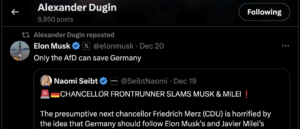The retweets of Elon Musk’s tweets by Alexander Dugin are not merely digital echoes—they are a deliberate signal. Dugin, the Russian ultranationalist and intellectual architect of an anti-Western authoritarian ideology, aligns himself with a figure who, by owning one of the world’s most influential communication platforms, has become an inadvertent, if not intentional, amplifier of ideas that undermine democracy.
This is not a trivial connection. Dugin’s reposts reveal a deeper alignment between authoritarianism and tech-powered libertarianism, a convergence with the potential to reshape global politics. What does it mean when the man often referred to as “Putin’s brain” endorses Musk’s rhetoric? What are the implications for Western liberal values when figures with radically different but overlapping aims start speaking to each other, even tacitly?
Alexander Dugin: Ideologue of a New Authoritarian World Order
To understand the gravity of Dugin’s retweets, one must first grasp who he is. Alexander Dugin is no ordinary political commentator. His philosophy of “Eurasianism” envisions a post-liberal global order dominated by Russia and allied states. He calls for the “end of Western civilisation,” not in abstract terms but through concrete political and cultural dismantling.
Dugin’s influence on Vladimir Putin’s Kremlin is significant, even if indirect. His book The Foundations of Geopolitics is a blueprint for Russian foreign policy, advocating for information warfare and the manipulation of internal divisions in Western democracies. “Dugin is not merely an ideologue but an architect of chaos,” says Mark Galeotti, a scholar on Russian power structures. “His ideas feed into the Kremlin’s playbook for destabilising the West.”
Elon Musk: Amplifier or Actor?
Elon Musk, by contrast, operates in a world seemingly detached from geopolitics. But Musk’s influence as the owner of X (formerly Twitter) and his penchant for controversial statements on global issues—from Ukraine to Germany, has elevated him to a position of enormous political significance.

Musk’s statement endorsing Germany’s far-right Alternative für Deutschland (AfD) party—“Only the AfD can save Germany” was retweeted by Dugin with evident approval. The AfD is a party that echoes many of Dugin’s own ideological positions: nationalism, anti-globalism, and a deep antagonism toward liberal elites. This alignment is not coincidental. Dugin sees in Musk a powerful disruptor, someone whose influence on public discourse can be weaponized for authoritarian ends.
“Musk may not realise the company he keeps,” says Timothy Snyder, a historian of authoritarianism. “But his platforms, his statements, and his ideas are being co-opted by figures like Dugin to undermine the liberal democratic order.”
Dugin’s Proximity to Putin
The closeness of Dugin to Putin has been a subject of speculation, but their ideological overlap is undeniable. Dugin’s vision of a multipolar world aligns neatly with Putin’s foreign policy goals. The war in Ukraine, for instance, can be seen as a realisation of Dugin’s theories about Russia’s historical destiny.
Even without a direct pipeline to the Kremlin, Dugin’s ideas shape Russia’s cultural and geopolitical posture. By amplifying Musk, Dugin sends a signal to his followers and perhaps even to the Kremlin: here is a man who can help disrupt the West from within.
A Dangerous Convergence
The danger lies not in a formal alliance between Musk and Dugin but in their mutual utility. Dugin sees Musk as a tool to amplify anti-liberal narratives in the West. Musk, in turn, benefits from the support of figures like Dugin, who provide ideological cover for his actions and statements.
This convergence is emblematic of a larger trend: the erosion of democratic values by figures who, intentionally or not, serve as conduits for authoritarian influence. Dugin’s tweets are a stark reminder of how the tools of modern communication—social media platforms, viral content, and influential voices—are being weaponised.
As Anne Applebaum has written, “The new authoritarianism does not rely on tanks and soldiers but on networks and narratives.” Dugin’s retweets of Musk epitomize this shift. By amplifying Musk, Dugin is co-opting a voice that has the power to influence millions in the West, furthering his own authoritarian agenda.
The Implications for Democracy
If the West is to safeguard its values, it must confront the ways in which authoritarian figures like Dugin exploit its openness. Musk’s role in this dynamic, whether as a naïve participant or a deliberate provocateur cannot be ignored. His statements and platforms have become arenas for ideological battles that could define the future of global governance.
“The danger is not Musk himself,” says historian Anne Applebaum. “It’s the ecosystem he enables, one in which authoritarianism and anti-liberalism thrive under the guise of free speech and open dialogue.”
The alliance between Dugin’s ideology and Musk’s influence may be accidental, but its consequences are not. The liberal democratic order, already under siege from within and without, must reckon with the ways in which technology and ideology intersect to erode its foundations.

